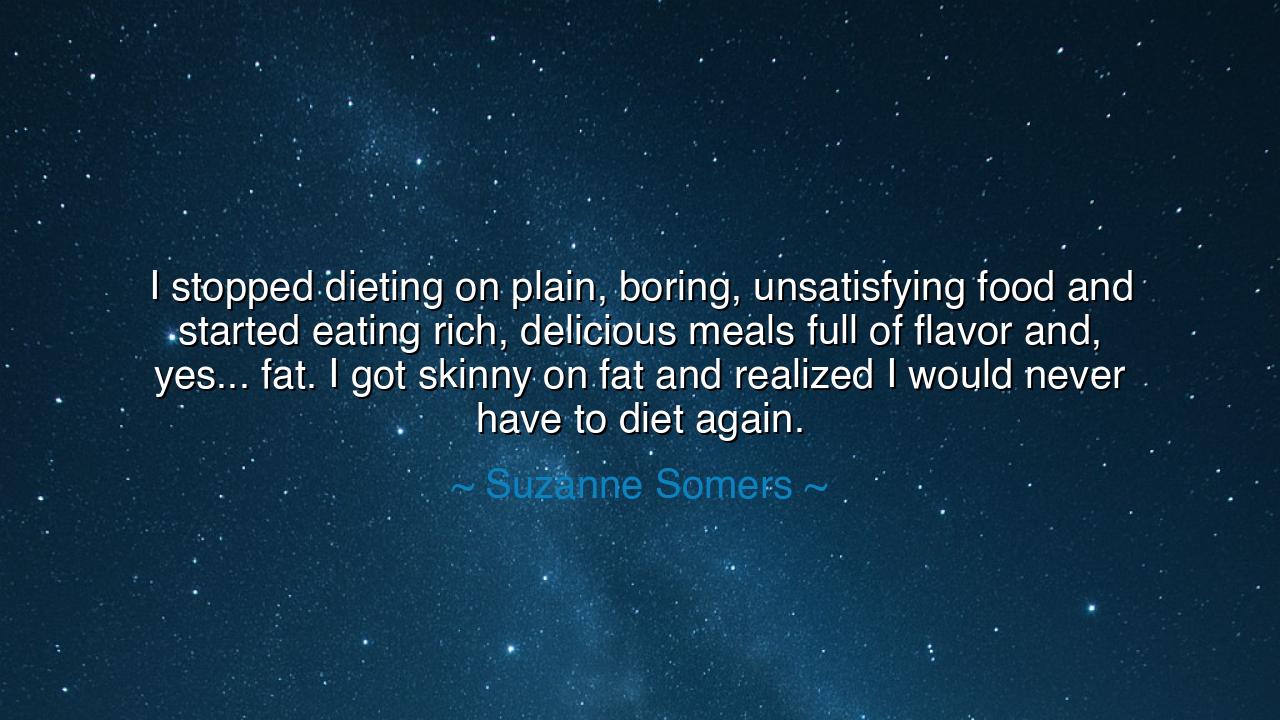
I stopped dieting on plain, boring, unsatisfying food and started
I stopped dieting on plain, boring, unsatisfying food and started eating rich, delicious meals full of flavor and, yes... fat. I got skinny on fat and realized I would never have to diet again.






In the journey of life, there are moments of profound revelation, when one realizes that true strength lies not in restriction, but in nourishment—not in denying the body the pleasures it craves, but in embracing the richness and abundance that nature has to offer. Suzanne Somers speaks to this truth when she declares, "I stopped dieting on plain, boring, unsatisfying food and started eating rich, delicious meals full of flavor and, yes... fat. I got skinny on fat and realized I would never have to diet again." With these words, she encapsulates a powerful lesson about the nature of health—one that calls us to reevaluate our relationship with food, to break free from the chains of restriction, and to embrace a more holistic and joyful way of nourishing ourselves.
Throughout history, the wisdom of the ancients has reminded us that balance is the key to a fulfilling life. In the philosophies of Aristotle, the great Greek thinker, we find the idea of the golden mean—the notion that virtue lies not in excess or deficiency, but in the middle. Just as Aristotle taught that wisdom is found in balance, so too is health found in the balance of the elements that we allow to nourish our bodies. The modern world, however, has often leaned toward excess in one direction—toward restriction—believing that by cutting away certain elements, like fat, we might achieve our desired shape. Yet, as Somers’ wisdom teaches, this path is fraught with dissatisfaction. It is the celebration of flavor, the richness of food, and the joy of eating that brings both nourishment and fulfillment.
Consider, too, the story of the ancient Romans, who, while known for their indulgence in food, understood that a life well-lived was a life of abundance in all things, not in deprivation. The philosopher Seneca, in his writings on ethics and well-being, advocated for a life of moderation—one that neither denied the pleasures of the body nor allowed them to dominate. The Romans, though they enjoyed their banquets and rich meals, knew that true well-being came from listening to the body and offering it what it needed. Somers' revelation mirrors this ancient understanding: it is not the denial of richness, but the embrace of it in a balanced and mindful way, that leads to true satisfaction and, ultimately, to health.
Somers’ journey—shifting from a mindset of restriction to one of nourishment—speaks to the deep wisdom found in the practices of the ancient healers and physicians. Hippocrates, often called the father of modern medicine, understood that food was not only for sustenance but also for healing. He famously said, "Let food be thy medicine, and let medicine be thy food." The key here is in understanding that food should not be something we battle against, but something that nourishes and strengthens us. Somers’ insight—that fat, once considered the enemy, could be the key to her health—is a reminder of the wisdom of ancient teachings, which did not seek to punish the body but to understand it, to find what it truly needs.
In the same way, Leonardo da Vinci, the great polymath of the Renaissance, understood that the body required nourishment in all forms—not just to fuel his intellectual pursuits but to maintain the vitality needed for his creative endeavors. Da Vinci did not see the body as something to be controlled by dieting and restriction, but as a partner in the journey of life. He believed that to create and innovate, one must also be in harmony with the body, providing it with the rich food and sustenance it needs. Somers’ approach aligns with this view—fat, long seen as a villain, is in fact a crucial player in the nourishment of the body, allowing it to function at its highest potential.
And so, we come to the heart of Somers' revelation: freedom comes not from restriction, but from understanding the body’s needs and feeding it with joy, flavor, and satisfaction. Her Somersizing approach invites us to liberate ourselves from the tyranny of fad diets and the false promises of quick fixes. It is not the restriction of life’s pleasures that leads to well-being, but the full embrace of them—moderately, mindfully, and joyfully. Somers has shown us that we do not need to shrink from food, to live in a world of deprivation and guilt. Instead, we are invited to celebrate the richness of life, to feed both the body and the soul with the bounty that the earth provides.
The lesson here is clear and timeless: nourishment is not a battle, nor is it a punishment. True health is found in the freedom to eat with joy, to embrace the pleasures of food without shame or guilt. Just as the ancients understood that balance was the key to a fulfilling life, so too must we learn to balance the richness of our meals with the wisdom of moderation. In this balance, we find not just the body we desire, but the life we deserve—one full of vitality, joy, and a deep connection to the pleasures of the world around us. Let us embrace this wisdom, as Somers has, and allow ourselves the freedom to nourish our bodies without fear, without guilt, and without limitation.






AAdministratorAdministrator
Welcome, honored guests. Please leave a comment, we will respond soon